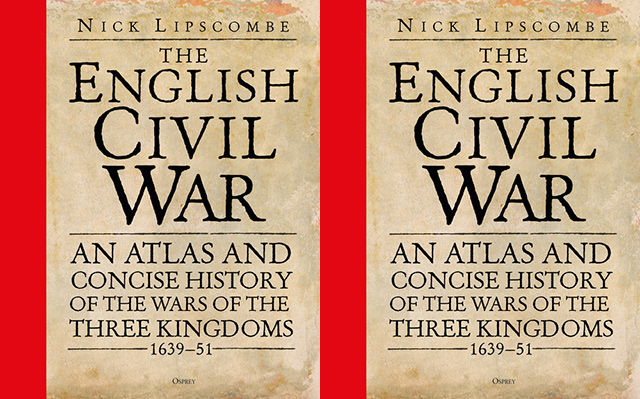The English Civil War: An Atlas and Concise History of the Wars of the Three Kingdoms 1639-51
Book review

The English Civil War: An Atlas and Concise History of the Wars of the Three Kingdoms 1639-51, Nick Lipscombe, Osprey, 2020, 389p, £50-00.
ISBN 9781472829726.
This is an extraordinarily thorough book. Simultaneously it manages both to provide a clear commentary on military experiences within the Three Kingdoms whilst also providing a sustained analysis. In producing this splendid volume, Nick Lipscombe has reflected modern-day research and analysis into what happened in the various battles and campaigns, within the presentation of what is a traditional narrative.
This work adopts a very wide perspective, in that it explores fully the military campaigns waged for, and against, the King in Ireland and Scotland, as much as those in England, and the result is a very balanced and informed analysis. It embraces the period of the ‘Bishops’ War’ which followed the Covenanters’ Declaration in 1639 through to the coronation of Charles II at Scone, to his escape to France at the end of 1651. The narrative is very clear and readable but the reader needs to be warned that the analysis is extensive and very detailed.
For those of us, fifty years ago, who basically depended on S. R. Gardiner’s memorable nine volumes on the Civil War and Protectorate, this work is transformational. It is transformative because of the way that it reports and embraces the best of modern-day research but it does so with an exceptional set of well-sourced maps and wonderfully-presented diagrams and battle plans. Nick Lipscombe has presented us with a scholarly compendium of what happened, and of who exactly was involved. My instincts about its quality are confirmed by the strong recommendation of this book by Professor Anne Curry on behalf of the Battlefields Trust.
This is a very thorough presentation, to the extent that it can properly be labelled as ‘encyclopaedic’. It can be strongly recommended to anyone with a general interest in those tumultuous times but it is also anticipated that it will become a widely-used resource by scholars.

